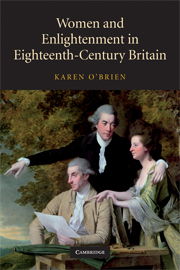Book contents
- Frontmatter
- Contents
- Acknowledgements
- Introduction: the progress of society
- 1 Anglican Whig feminism in England, 1690–1760: self-love, reason and social benevolence
- 2 From savage to Scotswoman: the history of femininity
- 3 Roman, Gothic and medieval women: the historicisation of womanhood, 1750–c.1804
- 4 Catharine Macaulay's histories of England: liberty, civilisation and the female historian
- 5 Good manners and partial civilisation in the writings of Mary Wollstonecraft
- 6 The history women and the population men, 1760–1830
- Notes
- Bibliography
- Index
5 - Good manners and partial civilisation in the writings of Mary Wollstonecraft
Published online by Cambridge University Press: 04 September 2009
- Frontmatter
- Contents
- Acknowledgements
- Introduction: the progress of society
- 1 Anglican Whig feminism in England, 1690–1760: self-love, reason and social benevolence
- 2 From savage to Scotswoman: the history of femininity
- 3 Roman, Gothic and medieval women: the historicisation of womanhood, 1750–c.1804
- 4 Catharine Macaulay's histories of England: liberty, civilisation and the female historian
- 5 Good manners and partial civilisation in the writings of Mary Wollstonecraft
- 6 The history women and the population men, 1760–1830
- Notes
- Bibliography
- Index
Summary
In her final work, the Letters on Education (1790), Catharine Macaulay turned, for the first time, to the matter of the current state of the progress of society and the ways it can be seen in the low educational level of the young. She offered a historically informed critique of modern manners, and suggested a remedy in an ambitious programme of identical education for girls and boys. This work, coming from a writer who had demonstrated a lifelong commitment to progressive political principles, had a profound impact on Macaulay's younger contemporary Mary Wollstonecraft. This chapter will endeavour to show how Wollstonecraft realised the potential of that critique of modern manners, from a similar radical political standpoint, for a feminist intervention in the course of social progress. Like Macaulay, Wollstonecraft engaged very critically with the cult of medieval chivalry and its degenerate manifestation in modern gallantry, but she was far more convinced than Macaulay of the value of the social analysis of the Enlightenment as a means of advancing the cause of male and female rights. Wollstonecraft can also be placed more squarely than Macaulay within an eighteenth-century British tradition of Latitudinarian religious thought that bridged the gap between Anglicanism and Rational Dissent, with its undogmatic emphasis upon God's benevolence, upon the free will and rationality of the human subject, and upon the public duty to promote the welfare of all members of society.
- Type
- Chapter
- Information
- Women and Enlightenment in Eighteenth-Century Britain , pp. 173 - 200Publisher: Cambridge University PressPrint publication year: 2009



